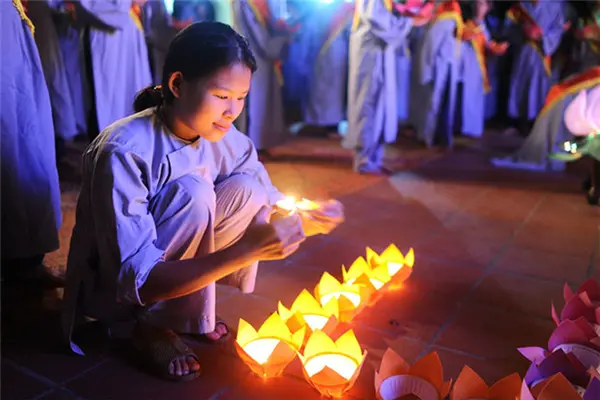Vietnamese people are now observing "ghost month" which falls in the seventh lunar month annually and is, as tradition holds, believed to be the time when ghosts and spirits depart the lower realms and rise to visit the living.
With the festival reaching its peak on the day of the full moon, the festival, known locally as "Vu Lan," has become exceedingly popular in Vietnam and is closely connected to the country's tradition of ancestor worship and filial piety, according to Nguyen Hung Vi, a senior Vietnamese cultural expert.
"During the lunar month, Vietnamese people think that the realms of heaven, hell and the living fade away, so ghosts are free to wander everywhere," said Vi, adding that "with such belief, Vietnamese people tend to avoid doing certain things to get rid of bad luck."
"They tell each other not to stay up late and go out at night, not to shout out other people's names, not to pick up money dropped on the street, and other such taboos during the month, to avoid bad luck," the expert said.
The taboos, in fact, span normal socio-economic activities of local people.
"They also avoid starting businesses, and holding groundbreaking and inaugural ceremonies during the month. Most Vietnamese people do not get married at the time as they say it is the month of lonely spirits," Vi explained.
During the festival, in Vietnam, pagodas are decorated beautifully and people gather to listen to the wise sayings of monks, who teach followers the virtues of filial piety, the cultural polymath told Xinhua of how Vietnamese people celebrate the festival.
Buddhist followers in Vu Lan Festival. Photo By:vietnam-tour.biz
"Almost all families across the country offer food, five kinds of different fruit, paper clothing and other items to the hungry spirits in the month," said Vi.
During the festival in Vietnam, it is commonplace to see people burning joss paper in front of their houses, in their residences or on the sidewalks. Some families even spend hours on burning all the joss papers they prepared.
Phan Minh Thu, a resident in the capital city of Hanoi, told Xinhua that "the Vu Lan festival is a chance for the living to carry out deeds of filial piety for their ancestors and the dead. My family always prepares joss papers, clothes, shoes, and household items made from paper to offer to the spirits."
This year for ghost festival, which began on Aug. 3 and will end on Aug. 31, Thu spent around 500,000 Vietnamese dong (about 22 U.S. dollars) on buying multiple offerings.
"Originally, the meaning of the festival is to make offerings to parents as well as holding an absolution ceremony for all spirits to pray for their salvation," said the expert.
However, during the ghost festival nowadays, these activities have been exaggerated and have become overly costly and complicated, as people usually spend a large amount of money on their offerings to the dead, Vi assessed.
"A ritual aiming to show respect to ancestors has been turned into an expensive and wasteful occasion to try and 'bribe' Buddhists and the spirits," said Vi.
Echoing Vi, Thich Duc Thien, general secretary of Vietnam Buddhist Shangha said the Vu Lan festival reminds each person of the merit of their parents, grandparents and ancestors. "Burning too much joss paper during the festival will damage its beautiful meaning," said the monk.
Originating from India, the story of honoring the dead reached China and the Chinese incorporated certain Buddhist teachings into their ceremonies.
Strongly influenced by the traditions of its neighbors, Vietnamese families began celebrating Vu Lan.
In China on the occasion, people usually release paper boats and lanterns on the water and visit the graves and tombs of their ancestors.
"In China nowadays, rituals have been made simpler to be less costly," said the expert, adding that this fact is worth taking into account in Vietnam.
(APD)
 简体中文
简体中文

